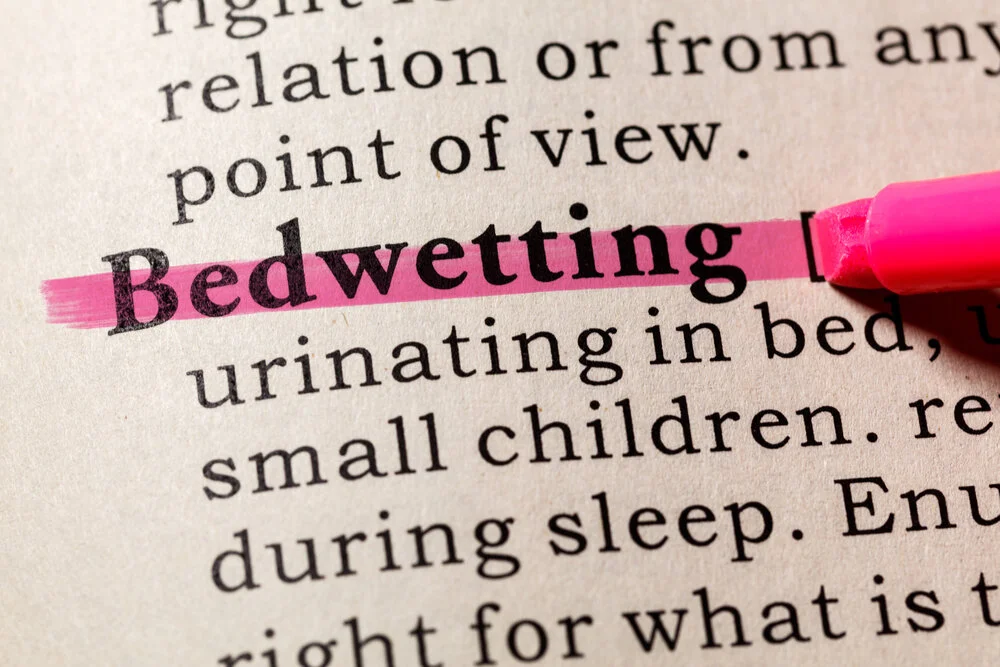
Bedwetting Solutions
What is Bedwetting & How to Stop it
At what age SHOULD children stop bedwetting?
Bedwetting – also known as nocturnal enuresis – affects most children up to the age of three as the development of bladder function control can be a slow process.
It’s a common problem and, according to figures published by the British Medical Journal, at the age of five as many as 20 children in 100 will have difficulty in controlling their bladders at night-time
By age seven, this figure has dropped to around eight children in every 100, so we can see that most children will develop that vital mind/body link at around the age of six years. It’s at this age that children enter a new developmental phase. A good indicator of this happening is the loss of milk teeth.
If your child has reached this stage of development and is still bedwetting, I’d recommend looking at ways of helping them to become dry at night, such as introducing the ‘Stop Bedwetting in 7 Days’ system. This is the right time to support your child’s natural development.
The research goes on to show that by age 10, there are still 5 children in every 100 experiencing problems. So, not much progress is made with children who are simply left waiting for nature to take its course.
It’s also been proven that bedwetting children who are given professional help and advice are more likely to become dry than those who aren’t. With one or two children in every 100 failing to achieve night-time dryness altogether, it is vitally important to get help at the right time. Prolonged childhood bedwetting that’s allowed to continue into adulthood can manifest itself in many ways: difficulties forming relationships and getting jobs, susceptibility to stress, anxiety and even depression.
So whilst there’s no ‘right’ age for becoming dry at night, there’s certainly a ‘wrong’ age for leaving the situation unchecked. It is possible to point your child in the right direction and help them to change their habits and behaviours in a natural way that’s in tune with their natural development.
What causes bedwetting in children?
Many reasons are put forward as possible causes of a bedwetting problem such as:
the size of the bladder
a urinary tract infection
a lack of hormones to concentrate urine
a condition that runs in families
stress and anxiety
sleep issues
Some children are referred to Enuresis Clinics by their family doctors and, as a first step in the process, it is sensible to rule out the possibility of any infection which can easily be treated with antibiotics, or to identify the possibility of some other physiological cause for the problem.
Once it’s been established that these do not play a part, the clinic will often suggest solutions such as using alarms in the bed, which will wake the child once wetness is detected. If alarms are not successful, children may be prescribed medication or drugs to concentrate their urine and even in extreme cases, will be offered anti- depressants.
Our bodies release a hormone whilst we sleep called vasopressin and this concentrates our urine. When children struggle to control their bladders at night, it’s often assumed that an absence of the hormone is the cause of this. Doctors, however, tell me that there is no definitive test to check whether this is the case in each particular child and so the use of a drug called Desmopressin – a synthetic hormone that mimics the action of the real hormone – is really a ‘best guess’.
It should solve the problem pretty much immediately, if it’s going to work at all, but I have come across children who have been taking it for many months and some even for years, without achieving dry nights – it’s still a hit and miss affair. After this time, it’s very likely that it’s not going to work at all and if your child is in this situation, I would recommend a return visit to the practitioner who prescribed it for you, with a view to stopping it altogether.
I believe the solution to this problem has to come ‘from within’ rather than from some sort of external crutch. Just like a smoker who quits cigarettes with the aid of nicotine replacement gum, or an overweight person who loses weight by drinking diet shakes, instead of eating proper food, the problem may appear to have been solved, but quickly returns once the crutch is taken away.
Neuro-psychologists now agree that there’s a complex co-ordination that needs to take place between the mind and the muscles of the bladder and more often than not, a delay in this happening is what holds children back.
New neural pathways or connections are needed to be made in the brain in order to achieve night-time dryness and the ‘Stop Bedwetting in 7 days’ programme is designed to do just that. Only changes made on the ‘inside’ can be guaranteed to produce long-lasting results on the ‘outside’.
Sleep Issues
It’s not uncommon for young children to experience a variety of sleep issues, such as nightmares, night terrors, sleep-walking, teeth grinding or sleep apnoea. The term given to these kinds of issues is parasomnia and some experts feel that bedwetting falls into this category. A good solution for most types of parasomnia is to keep anxiety levels down and listening to meditation, mindfulness and hypnosis audio downloads is a good way to do this.
Emotional Causes
In a minority of cases, there can be a sudden onset of bedwetting. If your child has been dry at night for several months or even years and starts having wet beds again, this can be caused by an emotional upset such as a change at home or stress with school work. This is usually temporary and not the same as an ongoing bedwetting problem. Most parents will be able to tell the difference, so if your gut feeling is that there is no real explanation for the bedwetting, go with your instincts but do monitor the situation closely.
Hannah’s Story
I stopped taking medication.
I remember one day when a 10 year old girl called Hannah came to see me. She’d tried everything to get dry at night including using noisy bedwetting alarms that woke her entire family up at night, except her. Eventually she was prescribed powerful drugs to inhibit the production of bodily fluids. Even these didn’t work, but she continued to take them in the hope that one day perhaps they would. The side effects of dry, flaking skin were clear to see and they gave her headaches too.
What really shocked me though, was that she was also prescribed anti-depressants – not because she was depressed, (although admittedly she was pretty unhappy) – but because it was hoped that the muscle relaxing effect of these would stop her bladder from wanting to empty at night.
I couldn’t understand how we could possibly do this to our children before trying other more natural methods first. I felt an enormous sense of duty to spread the word about the mind/body training exercises I’d devised that had already proved so successful, for so many children over the years. Hannah and I had a face-to-face consultation with in my London clinic and she continued to follow my online programme after that. In a few short weeks she not only had the results she desired, but was able to come off all medication for good.
What kind of solutions are offered?
Type “bedwetting solutions” into any internet search engine and you’ll be given a number of options and often conflicting advice. It’s no wonder parents often end up feeling confused.
Some experts will say that the problem is the result of a small bladder and that your child will simply grow out of their bed wetting as they get older. This can be sound advice, but also a risky strategy in my opinion, as not all children do grow out it and living with the problem for longer could in fact just make the habit become more deeply entrenched.
Others will recommend the use of electronic alarms – sensors are attached to the child’s pants or pyjamas at night time and trigger off an alarm bell as soon as wetness is detected.
Patience is required with this solution as it’s advised that the alarm is used consistently for at least 10 weeks before establishing whether it has worked or not.
For many families, this option doesn’t always work well and it’s not uncommon to hear stories of the bedwetting child continuing to sleep soundly through the sound of the alarm, as the rest of the household gets disturbed and woken up by the noise! However, some manufacturers do say that the alarm is designed to wake the parent and not the child, so that they can go into their bedroom and prompt them to visit the bathroom.
In some cases, children are referred to specialist clinics that prescribe medication designed to concentrate the urine at night time. It’s thought that the lack of a particular hormone is the cause of bedwetting. Too often though, I come across children taking this medication for several months or even years, for whom it simply doesn’t work.
In my experience of helping children with bed wetting problems, these methods can sometimes only manage the problem in the short term rather than cure it for good, so It’s not unusual for around 70% of children to go back to their old habits and behaviours after 2-3 months.
I believe the best bedwetting solution is to encourage your child’s mind and body to work more closely together through a training programme of visualization exercises. Children’s minds are continually creating new connections called neural pathways, to accommodate new patterns of thinking and behaving – in just the same way they do when learning how to tie shoelaces, play a musical instrument, swim or ride a bike.
In my therapy practice, I’ve been seeing children with bedwetting problems regularly since 2004 and I do believe I’ve developed a quicker, safer and more natural alternative to changing night time habits for good. It doesn’t involve any gadgets nor giving a child drugs – which has to be a good thing.
Online Programme
-
Stop bedwetting in 7 days is an online programme made to help your child stop bed wetting for good.
-
£197
Ways to work with me
One-to-one Consultations
-
Personal time with me is the next step up from my online programme. I offer virtual appointments via Zoom and also in-person appointments in my Harley Street clinic in London.
It’s possible to start with a 30-minute parenting call via Zoom. I’ll give you advice, support and information on how best to manage the problem and you might find this call is all you need.
Evening or weekend appointments are available and I can accommodate different time zones.
-
30 minute Parenting calls via Zoom: £150
1-hour consultation in London - £300 per hour.
1-hour consultation via Zoom - £250
We can also work together on a longer term, monthly basis.
PAYMENT OPTIONS ARE AVAILABLE
Personalised Monthly Coaching
-
This is an individualised programme that provides accountability, support and guidance for your child for one whole month.
You have the additional option of an in-person session in London, before we start our online package of sessions. This is useful if you feel anxiety plays a big part in your child’s life.
With this monthly coaching option, I’ll meet with your child via Zoom and at the same time they’ll also follow my online programme. I’ll be tracking their progress and ensure things are going well. There’s always an option for an additional call should there be a bit of a crisis.
I also include Zoom calls for parents and we’ll be in regular email contact throughout. I’ll be giving you progress updates, extra advice and tips on how to manage things at your end.
-
One month Coaching - £1,495
Three months Coaching - £4,000
PAYMENT BY INSTALMENTS OPTION IS AVAILABLE
Bespoke Service
-
This is a tailor-made service that will accommodate all your needs and so I can only work like this with a few families each year.
We’ll work closely together for a minimum of six weeks and I can accommodate foreign travel, consultations at home, school visits as well as an out-of-hours and weekend service.
I know how difficult it can be to solve a bedwetting problem and so a ‘hands-on’ approach from a professional may be just what you need. We’ll get to know each other well during our time together and so it’s likely I’ll become more of a family therapist to you all, solving other problems along the way.
As well as tackling the bedwetting problem, you’ll have the benefit of my experience and expert advice across the board - including medical and educational. I can arrange appointments for blood tests, nutrition/dietary advice, physiotherapy, educational, dyslexia and ADHD support. I have a very good contact list and will give you the benefit of my extensive knowledge, in order to solve all your problems.
We’ll have an initial interview to discuss how this could work for you and to see if we’re a good fit for each other.
-
Varies according to your specific needs and requirements.
PAYMENT BY INSTALMENTS OPTION IS AVAILABLE










